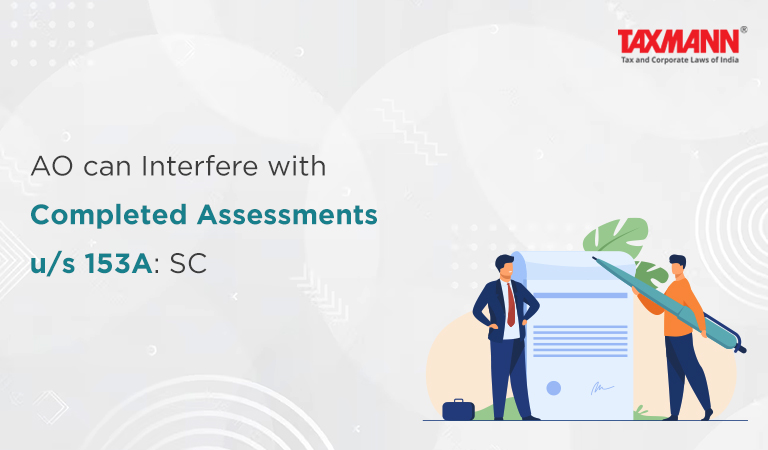AO can Interfere with Completed Assessments u/s 153A: SC
- Blog|News|Income Tax|
- 2 Min Read
- By Taxmann
- |
- Last Updated on 27 April, 2023

Case Details: PCIT v. Abhisar Buildwell (P.) Ltd. - [2023] 149 taxmann.com 399 (SC.)
Judiciary and Counsel Details
-
- M.R. Shah & Sudhanshu Dhulia, JJ.
Facts of the Case
The issue before the Supreme Court was
“Whether in respect of completed assessments/unabated assessments, the jurisdiction of AO to make assessment is confined to incriminating material found during the course of search under Section 132 or requisition under Section 132A or not?”
The revenue contended that AO has the jurisdiction to assess the ‘total income’ considering other material, though no incriminating material was found during the search, even in respect of completed/unabated assessments.
The matter was reached to different High Courts, and courts held that no addition could be made to completed/unabated assessments without incriminating material. The lead judgment is by the Delhi High Court in the case of Kabul Chawla v. CIT [2015] 61 taxmann.com 412 (Delhi), which has been subsequently followed and approved by the other High Courts. The Delhi High Court held that in the absence of any incriminating material, the AO could make no addition, and the AO has no jurisdiction to re-open the completed assessment.
Supreme Court Held
The Supreme Court held that section 153A was added to the statute to eliminate the practice of conducting two separate assessments and taxing “undisclosed” income at a regular tax rate instead of a special rate. As a result of this amendment, in the event of a search, a block assessment for six years will be conducted. To initiate a search assessment or block assessment under Section 153A, a valid search must be conducted under Section 132.
The very purpose of the search, which is a prerequisite/trigger for invoking the provisions of section 153A is detecting undisclosed income by undertaking extraordinary power of search and seizure, i.e., the income which cannot be detected in the ordinary course of regular assessment.
Thus, the foundation for making search assessments under Sections 153A/153C can be said to be the existence of incriminating material showing undisclosed income detected as a result of the search. Accordingly, the Supreme Court upheld the view taken by the Delhi High Court in the case of Kabul Chawla.
Therefore, if incriminating material is discovered during a search conducted under Section 132 or requisition under Section 132A, the AO would have the authority to assess or reassess the “total income,” considering the collected material, even if the assessment has been completed.
If no incriminating material is found during a search and the assessment is already completed or unabated, the revenue’s only option would be to initiate reassessment proceedings under sections 147/48 of the Act, provided the conditions mentioned in sections 147/148 are fulfilled.
Disclaimer: The content/information published on the website is only for general information of the user and shall not be construed as legal advice. While the Taxmann has exercised reasonable efforts to ensure the veracity of information/content published, Taxmann shall be under no liability in any manner whatsoever for incorrect information, if any.

Taxmann Publications has a dedicated in-house Research & Editorial Team. This team consists of a team of Chartered Accountants, Company Secretaries, and Lawyers. This team works under the guidance and supervision of editor-in-chief Mr Rakesh Bhargava.
The Research and Editorial Team is responsible for developing reliable and accurate content for the readers. The team follows the six-sigma approach to achieve the benchmark of zero error in its publications and research platforms. The team ensures that the following publication guidelines are thoroughly followed while developing the content:
- The statutory material is obtained only from the authorized and reliable sources
- All the latest developments in the judicial and legislative fields are covered
- Prepare the analytical write-ups on current, controversial, and important issues to help the readers to understand the concept and its implications
- Every content published by Taxmann is complete, accurate and lucid
- All evidence-based statements are supported with proper reference to Section, Circular No., Notification No. or citations
- The golden rules of grammar, style and consistency are thoroughly followed
- Font and size that’s easy to read and remain consistent across all imprint and digital publications are applied



 CA | CS | CMA
CA | CS | CMA
